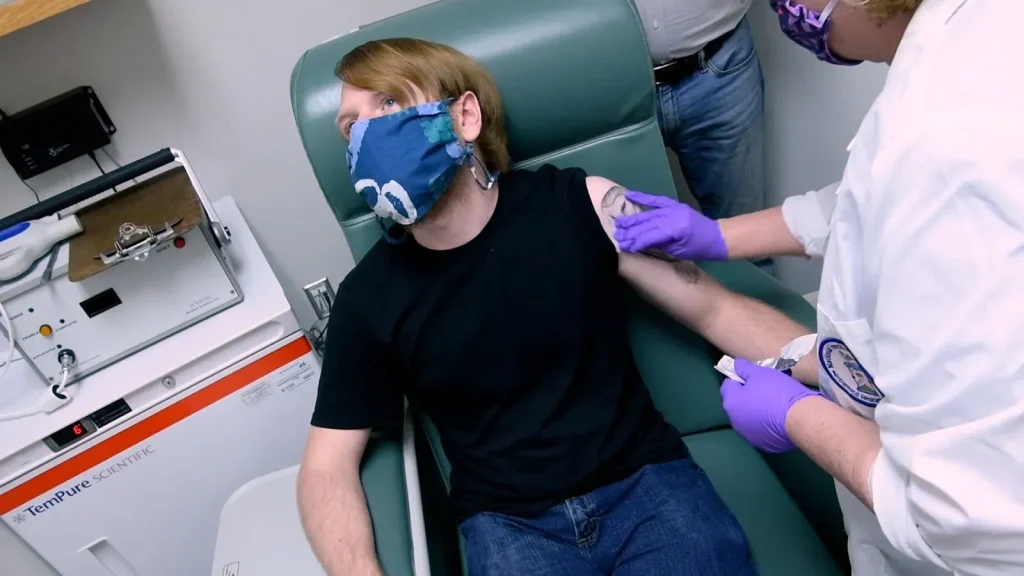Recent studies have flagged a disturbing potential link between the Pfizer COVID vaccine and eye damage, raising alarms about long-term vision problems. Researchers have observed changes in the cornea among individuals who received the vaccine, leading to concerns about Pfizer vaccine side effects related to ocular health. Specifically, the data indicates an increase in corneal thickness and a reduction in endothelial cell density, which are critical to maintaining clear vision. Corneal edema and endothelial cell loss may ensue, potentially culminating in severe conditions such as vision loss after vaccine administration. As the scientific community delves deeper into these findings, vigilance regarding COVID-19 vision problems becomes paramount for both patients and healthcare providers.
The investigation of ocular complications stemming from the Pfizer-BioNTech vaccine has unearthed significant health insights, particularly regarding eye health after vaccination. Known variably as ocular reactions or vision disturbances post-vaccination, these concerns are becoming increasingly relevant for recipients and healthcare professionals alike. Preliminary findings suggest that individuals receiving the Pfizer vaccine may experience unexpected changes in corneal integrity, leading to conditions that could threaten visual acuity. Medical experts emphasize the importance of monitoring for signs of corneal edema and variations in endothelial cell performance following vaccination. As this topic evolves, understanding the implications of COVID vaccine-related ocular effects is vital for comprehensive patient care.
Overview of Pfizer COVID Vaccine and Eye Damage
Recent studies have indicated a potential link between Pfizer’s COVID-19 vaccine and various eye damage issues, prompting a closer examination of vaccine side effects. The effect on ocular structures, particularly the cornea, has raised concerns among scientists and medical professionals alike. As people seek to protect themselves from COVID-19 through vaccination, understanding the implications on eye health, including conditions like corneal edema and endothelial cell loss, becomes increasingly important.
The research conducted in Turkey focused on evaluating the changes within the cornea after recipients received both doses of the Pfizer vaccine. The findings revealed that participants experienced an increase in corneal thickness and a decrease in endothelial cell density following vaccination. These changes suggest that while immediate vision problems might not manifest, the alterations in corneal structure could have longer-term implications for visual health.
Frequently Asked Questions
What is the link between Pfizer COVID vaccine and eye damage?
Recent studies have suggested a potential link between the Pfizer COVID vaccine and eye damage, particularly regarding corneal health. Researchers observed changes in the cornea’s endothelial cells after vaccination, which may increase the risk of conditions like corneal edema and vision loss.
Can Pfizer vaccine side effects lead to vision loss?
Studies indicate that side effects from the Pfizer vaccine could potentially contribute to vision loss, particularly if patients experience a reduction in endothelial cell density in the cornea. Although immediate vision problems were not reported, ongoing monitoring is essential for those at risk.
What are the signs of COVID-19 vision problems after receiving the Pfizer vaccine?
Common signs of vision problems related to the Pfizer COVID vaccine could include blurry vision or discomfort in the eyes. If you experience these symptoms, it’s important to consult an eye care professional for evaluation.
How does the Pfizer COVID vaccine affect corneal endothelial cells?
The Pfizer COVID vaccine has been associated with changes in corneal endothelial cells, including a decrease in cell density and increased variation in cell size. These alterations could potentially lead to corneal edema and impact overall vision health.
What is corneal edema and is it a risk after the Pfizer vaccine?
Corneal edema refers to swelling in the cornea that can lead to blurry vision. Research has shown that the Pfizer COVID vaccine may create conditions that increase the risk of corneal edema, particularly for individuals with pre-existing eye conditions.
Is vision loss after vaccine a common concern for vaccinated individuals?
While vision loss after receiving the Pfizer vaccine is not common, emerging studies indicate that some individuals may experience changes in their corneal health. It is crucial for patients to report any vision changes to their healthcare providers.
What should individuals with pre-existing eye conditions know about the Pfizer vaccine?
Individuals with pre-existing eye conditions should be aware of potential risks associated with the Pfizer COVID vaccine, such as endothelial cell loss. They should consult their eye care provider before vaccination and monitor any vision changes post-vaccination.
Do changes in corneal thickness after the Pfizer vaccine indicate eye damage?
Increased corneal thickness observed after the Pfizer vaccine may suggest adaptive changes, but it does not automatically indicate eye damage. Long-term studies are needed to determine the permanency of these changes and their implications for vision.
Can endothelial cell loss happen after the Pfizer COVID vaccine?
Yes, the Pfizer COVID vaccine has been linked to endothelial cell loss in the cornea. This could affect eye health and potentially lead to conditions such as bullous keratopathy if cell loss becomes significant.
How can individuals monitor their eye health after receiving the Pfizer vaccine?
Individuals can monitor their eye health post-vaccination by keeping an eye out for symptoms like blurry vision or discomfort. Regular check-ups with an eye doctor using specular microscopy can assess corneal health and endothelial cell counts.
| Key Findings | Details |
|---|---|
| Link to Eye Damage | Study found Pfizer COVID-19 vaccine might increase risk of eye damage, especially affecting the cornea. |
| Thicker Corneas | Average corneal thickness increased from 528 to 542 micrometers (approx. 2% increase). |
| Endothelial Cell Changes | Endothelial cell count reduced by 8% from 2,597 to 2,378 cells/mm². |
| Variation in Cell Size | Coefficient of variation for cell size increased, indicating irregularity in cell shape. |
| Long-term Concerns | If changes persist, could lead to corneal edema, blurred vision, or other severe conditions. |
| Monitoring Recommendations | Patients with low endothelial count or history of keratoplasty should be monitored closely. |
| Conclusion | Further studies needed to assess long-term impacts on vision health. |
Summary
Pfizer COVID vaccine eye damage is a growing area of research as studies indicate potential risks associated with the vaccine. Recent findings suggest that the vaccine could lead to significant changes in corneal thickness and endothelial cell density, raising concerns regarding long-term vision health. As scientists continue to investigate these effects, it is crucial for individuals, especially those with pre-existing eye conditions, to stay informed and seek regular eye health evaluations.



